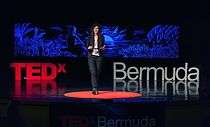Elizabeth Stokoe
| Elizabeth Stokoe | |
|---|---|
 | |
| Nationality | British |
| Fields | Social psychology, Conversation analysis |
| Institutions | Loughborough University |
| Alma mater | Leicester University |
| Known for | Research in conversation analysis, Conversation Analytic Role-play Method |
Elizabeth Stokoe is a British scientist and Professor of Social Interaction at Loughborough University where she studies conversation analysis.[1]
Education
 | |
|
| |
|
| |
|
|
She graduated from the University of Central Lancashire (Preston Poly) in 1993 with a traditional psychology degree. Then Stokoe completed three years PhD research at Nene College (Leicester University) under the supervision of Dr. Eunice Fisher. She studied video recordings of university tutorials, and conducted conversation analyses of the way students produced topical talk, topic management, academic identity, and the relevance of gender.[5]
Career
Stokoe joined the Department of Social Sciences at Loughborough in October 2002 and was promoted to Reader in 2007 and Chair in 2009. She teaches on the BSc Social Psychology programme, covering modules in relationships, qualitative methods and forensic psychology.
Stokoe has studied interaction in settings including police interviews with subjects and speed-dating. Her current research includes hostage negotiation, commercial sales calls, and appointment making calls to general practice surgeries.[5]
Stokoe developed the Conversation Analytic Role-play Method (CARM), an approach to communications skills training based on evidence about what sorts of problems and roadblocks can occur in conversation, as well as the techniques and strategies that best resolve these problems.[3] CARM can be adapted to any sort of workplace or institutional encounter. In contrast to traditional role-play, CARM uses audio and video recordings of real-time, actual encounters to identify conversational problems and roadblocks as well as effective practices for avoiding and resolving them. CARM won a WIRED Innovation Fellowship 2015.[6]
She co-edited the journal Gender and Language from 2011 to 2014 and was associate editor of the British Journal of Social Psychology from 2009 to 2014.[7] She was a guest editor on a special issue of Discourse Studies on the topic of membership categorization analysis and social interaction.[8] She launched the journal Mediation Theory and Practice and is on the board of the College of Mediators.[9][10][5]
Stokoe spoke about CARM at TEDxBermuda in October 2014.[2]
Selected bibliography
Stokoe's academic publications include:[11]
Books
- Stokoe, Elizabeth; Benwell, Bethan (2006). Discourse and identity. Edinburgh: Edinburgh University Press. ISBN 9780748617500.
- Stokoe, Elizabeth; Speer, Susan A. (2011). Conversation and gender. Cambridge New York: Cambridge University Press. ISBN 9780521696036.
- Stokoe, Elizabeth; Tileagă, Cristian (2016). Discursive psychology: classic and contemporary issues. Oxford New York: Routledge. ISBN 9780415721608.
Chapters in books
- Stokoe, Elizabeth; Benwell, Bethan (2010), "University students resisting academic identity", in Griffiths, Patrick; Merrison, Andrew John; Bloomer, Aileen, Language in use: a reader, London New York: Routledge, pp. 82–97, ISBN 9780415442046.
- Stokoe, Elizabeth; Benwell, Bethan (2010), "Analysing identity in interaction: contrasting discourse, genealogical, narrative and conversation analysis", in Wetherell, Margaret; Mohanty, Chandra Talpade, The sage handbook of identities, Thousand Oaks, California: Sage, pp. 82–104, ISBN 9781412934114.
- Stokoe, Elizabeth; Speer, Susan A. (2011), "An introduction to conversation and gender.", in Stokoe, Elizabeth; Speer, Susan A., Conversation and gender, Cambridge New York: Cambridge University Press, pp. 1–27, ISBN 9780521696036.
Journal articles
- Stokoe, Elizabeth; Edwards, Derek (February 2011). ""You don't have to answer": lawyers' contributions in police interrogations of suspects". Research on Language & Social Interaction. Taylor and Francis. 44 (1): 21–43. doi:10.1080/08351813.2011.543877.
- Stokoe, Elizabeth (June 2012). "Moving forward with membership categorization analysis: methods for systematic analysis". Discourse Studies, special issue: Categories and Social Interaction: Current Issues in Membership Categorization. Sage. 14 (3): 277–303. doi:10.1177/1461445612441534.
- Stokoe, Elizabeth (June 2012). "Categorial systematics". Discourse Studies, special issue: Categories and Social Interaction: Current Issues in Membership Categorization. Sage. 14 (3): 345–354. doi:10.1177/1461445612441543.
- Stokoe, Elizabeth (April 2013). "The (in)authenticity of simulated talk: comparing role-played and actual interaction and the implications for communication training". Research on Language & Social Interaction. Taylor and Francis. 46 (2): 165–185. doi:10.1080/08351813.2013.780341.
- Stokoe, Elizabeth (July 2014). "The Conversation Analytic Role-play Method (CARM): a method for training communication skills as an alternative to simulated role-play". Research on Language & Social Interaction, special issue: Conversation Analysis and Intervention. Taylor and Francis. 47 (3): 255–265. doi:10.1080/08351813.2014.925663.
References
- ↑ "BBC Radio 4 - The Life Scientific, Elizabeth Stokoe". BBC.co.uk. 25 June 2013. Retrieved 10 August 2014.
- 1 2 "The conversational racetrack, Elizabeth Stokoe, TEDxBermuda". tedxtalks.ted.com. TEDx Talks. Retrieved 2 June 2015.
- 1 2 "Home page". carmtraining.org. CARM (Conversation Analytic Role-play Method). Retrieved 4 November 2014.
- ↑ Stokoe, Elizabeth. "CARM -- Conversation Analytic Role Play Method". YouTube. Loughborough University. Retrieved 17 June 2015.
- 1 2 3 "Elizabeth Stokoe - Biography". Loughborough University. Retrieved 17 June 2015.
- ↑ "WIRED Innovation Fellowship". Loughborough University. Retrieved 17 June 2015.
- ↑ "Gender and Language, editorial team: advisory board". Gender and Language. Equinox. Retrieved 29 May 2015.
- ↑ Stokoe, Elizabeth (June 2012). "Categorial systematics". Discourse Studies, special issue: Categories and Social Interaction: Current Issues in Membership Categorization. Sage. 14 (3): 345–354. doi:10.1177/1461445612441543.
- ↑ "Mediation Theory and Practice". College of Mediators. Retrieved 17 June 2015.
- ↑ "About the College". College of Mediators. Retrieved 17 June 2015.
- ↑ "Elizabeth Stokoe - publications". Loughborough University. Retrieved 17 June 2015.